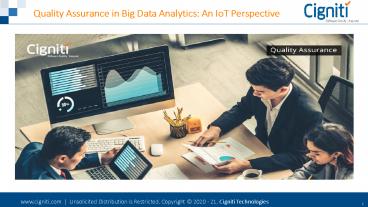Quality Assurance in Big Data Analytics: An IoT Perspective - PowerPoint PPT Presentation
Title:
Quality Assurance in Big Data Analytics: An IoT Perspective
Description:
The rise of the Internet of Things (IoT) as a primary data contributor in big data applications has posed new data quality constraints, necessitating the creation of an IoT-inclusive data validation ecosystem. – PowerPoint PPT presentation
Number of Views:54
Title: Quality Assurance in Big Data Analytics: An IoT Perspective
1
Quality Assurance in Big Data Analytics An IoT
Perspective
2
Quality Assurance in Big Data Analytics An IoT
Perspective
The rise of the Internet of Things (IoT) as a
primary data contributor in big data applications
has posed new data quality constraints,
necessitating the creation of an IoT-inclusive
data validation ecosystem. In a big data
testing, standardized data quality methodologies
and frameworks are available for data acquired
from a range of sources such as data warehouses,
weblogs, social media, and so on. Because IoT
data is so different from traditional data, the
issues of assuring its quality are likewise
distinct, necessitating the use of a specially
built IoT data testing layer. IoT engineers and
executives must ensure that their IoT deployments
have a solid data governance program in place,
one that addresses the necessary data quality
measures as well as how to ensure that they are
met and maintained. Any conclusions or
forecasts based on facts that do not satisfy a
predetermined criterion are faulty, and when
predictions skew in the wrong direction, they can
cost an organization money. Precision, record
completeness, data set completeness,
authenticity, reliability, originality,
coherence, accuracy, usability, and availability
are all objective properties or dimensions that
data scientists can measure to assess data
quality. Usability, credibility,
interpretability, and objectivity are examples of
subjective attributes.
3
Quality Assurance in Big Data Analytics An IoT
Perspective
Data quality exists on a spectrum, and the
techniques and tools used to acquire, combine,
store, and analyze data vary along that spectrum.
Identifying the nature of the data collected and
the reason for which it will be used will dictate
the shape of the solution employed to ensure that
the quality is appropriate for the
purpose. Data from endpoint devices has far
higher data quality requirements than data from
an IoT deployment intended to improve
efficiency. The majority of current scientific
and industry efforts in IoT are focused on
developing integrated platforms in order to
realize its commercial potential. The present IoT
and Big Data setting poses a variety of issues,
such as ensuring sensor data quality defined by
accessibility and veracity. Traditional signal
processing methodologies are no longer enough,
necessitating a combination of architectural and
analytical approaches. The rapid expansion of
IoT testing brings with it a slew of new
challenges that must be addressed. Data created
by internet-connected devices is growing at an
exponential rate, and the storage capacity of Big
data systems is limited, thus storing and
managing such a massive volume of data has become
a major difficulty. To collect, save, and process
this data, some procedures and frameworks must be
designed.
4
Quality Assurance in Big Data Analytics An IoT
Perspective
Cigniti offers independent quality engineering
and a wide range of software testing services and
solutions for the next generation enterprises and
ISVs across the globe. Our experienced and
deep-skilled quality assurance professionals have
a hands-on, end-to-end understanding of the
challenges faced by enterprises while on the path
of digital transformation. We implement the best
possible software testing methodologies and
applications, a Testing Center of Excellence, and
world-class software testing Labs to deliver on
our promise of Quality Engineering, Quality
Assurance, and Digital Assurance. Whether you
have desktop, mobile or next-gen-based
applications, our software testing specialists
work with a focused approach to help you get more
out of your testing efforts and improve time to
market, and thus, your ROI. Get in touch with
our Quality Assurance experts to learn more about
quality assurance in big data analytics from an
IoT perspective. Read Full Blog at
https//www.cigniti.com/blog/quality-assurance-bi
g-data-analytics-iot
5































